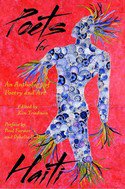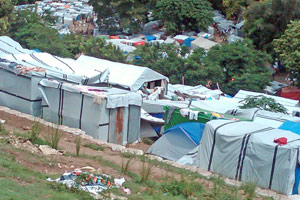 Image courtesy of Yileen PressAmong the strains of literary response to crisis, post-earthquake poetry has its own potent tradition. After the 2008 earthquake that decimated part of Sichuan province in China, Chinese poetry experienced a mini “renaissance,” with hundreds of civilian and professional poets contributing work to the Anthology of Poetry for Wenchuan. In the wake of the recent earthquake in Chile, contemporary writers invoked Pablo Neruda, whose 1950 “Earthquake” now seems a prescient picture of things to come: “I awakened when dreamland gave way beneath my bed. / A blind column of ash tottered in the middle / of the night, / and I ask you: am I dead?” Beyond verse, Japan’s superstar novelist Haruki Murakami produced After the Quake in 2000, a collection of short stories shot through with the surreal aftershocks, in ordinary life, of the Kobe earthquake. Readers seeking uplift after disaster will find a more bittersweet succor in these works. The best of them forgo generalizing anthems of “hope” or “redemption” in favor of subtler evocations of pain, pleasure, darkness, light, and the fragile ecosystems thrown off kilter by the quakes’ destructive force.
Image courtesy of Yileen PressAmong the strains of literary response to crisis, post-earthquake poetry has its own potent tradition. After the 2008 earthquake that decimated part of Sichuan province in China, Chinese poetry experienced a mini “renaissance,” with hundreds of civilian and professional poets contributing work to the Anthology of Poetry for Wenchuan. In the wake of the recent earthquake in Chile, contemporary writers invoked Pablo Neruda, whose 1950 “Earthquake” now seems a prescient picture of things to come: “I awakened when dreamland gave way beneath my bed. / A blind column of ash tottered in the middle / of the night, / and I ask you: am I dead?” Beyond verse, Japan’s superstar novelist Haruki Murakami produced After the Quake in 2000, a collection of short stories shot through with the surreal aftershocks, in ordinary life, of the Kobe earthquake. Readers seeking uplift after disaster will find a more bittersweet succor in these works. The best of them forgo generalizing anthems of “hope” or “redemption” in favor of subtler evocations of pain, pleasure, darkness, light, and the fragile ecosystems thrown off kilter by the quakes’ destructive force.
On February 23, six weeks after the earthquake that ravaged Port-au-Prince, Haiti, a group of writers convened at Harvard University to read their own work. Among the eighteen writers gathered were the former US Poet Laureate Robert Pinsky, the prominent Boston-area poets Gail Mazur and Daniel Tobin, several Haitian-born poets, and one high school senior who emigrated from Haiti to Boston in 2001. The benefit reading, conceived in conjunction with Partners in Health, drew a capacity crowd and inspired the publication of Poets for Haiti: An Anthology of Poetry and Art. This slim volume collects verse from the event, with an introduction by its organizer, Kim Triedman, a preface by the founders of Partners in Health, and a color insert with paintings, drawings, and collages by Haitian artists. It also features work by Lucille Clifton, the National Book Award-winning poet who passed away just days before the event.
There are numerous moments of beauty within its few pages. Clifton’s contribution, “cruelty,” makes no mention of the earthquake, but describes killing roaches without pause: “i took a broom to their country / and smashed and sliced without warning / without stopping and i smiled all the time i was doing it.” The consequence of this sudden and final disruption, writ small, is a sort of impersonation of an earthquake’s caprice: “now i watch myself whenever i enter a room. / i never know what i might do.” Elsewhere, poets invoke a landscape changed and uprooted—dusty, waterbound, and awash in strange new geometries. In Triedman’s fine “Life Was Easier as a Square—,” the fractured spareness of the lines mimics the zigzag silhouette of rooftops made unstable: “Everything suddenly / formless— edges bleed / and bleed; the chaos / of curve. / Even night comes / charging in, even dreams, / unbidden.” This is the newfound wildness of the city, where now exist “Above our heads: / blitzkrieg – / gunfire – / rooflines tipping / carelessly toward the sea.” Even those who have escaped the quake’s most immediate horrors find a precarious calm: “There is a light in each / window, only it is a lamp / to read our battles by,” Christina Davis remarks in “Fundament.”
Poets for Haiti is modest in size and scope: It does not attempt to “solve,” or resolve, the event in neat epiphanies. This is what gives the book its force. There is a small beauty in its portraits of devastation, a whisper of potential. Danielle Legros Georges’ “Intersection,” which opens the collection, conjures the ramshackle rhythm of the quake, framing and re-framing the ground’s movement: “The earth shook. A portal opened. / I walked through it. The earth shook. / A portal opened. I walked through / it. The earth shook. A portal opened.” After endless iterations of this phrase, the final line enacts the quiet gesture of the anthology: “The earth / shook. A portal opens. I walk through it.” From past to present, and into a future where all we can do is continue to exist.
All proceeds of the sale of this book go to Partners in Health’s humanitarian efforts in Haiti. To watch a recording of the original reading online, click here and here.
Front page image courtesy of Wikimedia Commons










